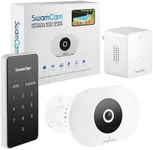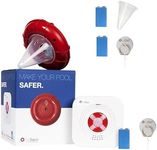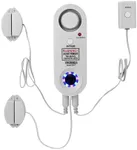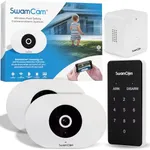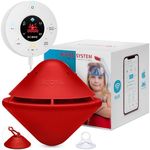Buying Guide for the Best Above Ground Pool Alarms
Choosing the right above-ground pool alarm is crucial for ensuring the safety of your pool area. These devices are designed to alert you if someone or something enters the pool unexpectedly, which can help prevent accidents and provide peace of mind. When selecting a pool alarm, it's important to consider various specifications to find the best fit for your needs. Here are some key specs to look at and how to navigate them.Type of AlarmThere are different types of above-ground pool alarms, including surface wave detection alarms, subsurface disturbance alarms, and wearable alarms. Surface wave detection alarms float on the water and detect changes in water movement, while subsurface disturbance alarms are installed below the water surface and detect changes in water pressure. Wearable alarms are worn by children or pets and sound an alarm if they get wet. Choose the type based on who or what you want to monitor and the level of sensitivity you need.
SensitivitySensitivity refers to how easily the alarm is triggered by movement or disturbances in the water. High sensitivity alarms can detect even small disturbances, which is ideal for monitoring young children or pets. However, they may also trigger false alarms due to wind or rain. Lower sensitivity alarms are less likely to trigger false alarms but may not detect smaller disturbances. Consider the environment of your pool and the level of monitoring you require to determine the right sensitivity level.
RangeThe range of a pool alarm indicates how far the signal can travel from the alarm to the receiver. A longer range is beneficial if you want to be alerted when you are inside your house or further away from the pool. Typical ranges can vary from 100 feet to over 300 feet. Assess the distance between your pool and where you will be most of the time to choose an alarm with an appropriate range.
Power SourcePool alarms can be powered by batteries, solar energy, or a direct electrical connection. Battery-powered alarms are portable and easy to install but require regular battery changes. Solar-powered alarms are eco-friendly and have low maintenance but depend on sunlight. Electrically powered alarms provide consistent power but may require professional installation. Consider the convenience and practicality of each power source for your specific situation.
Ease of InstallationSome pool alarms are easier to install than others. Surface wave detection alarms are generally simple to set up, while subsurface disturbance alarms may require more effort and possibly professional installation. Wearable alarms are straightforward but need to be worn consistently. Evaluate your comfort level with installation and whether you prefer a DIY approach or professional help.
Alarm VolumeThe volume of the alarm is important to ensure you can hear it from a distance or inside your home. Alarms typically range from 85 decibels to over 100 decibels. A louder alarm is more likely to be heard over background noise, but it may also be more disruptive. Consider your household's noise level and how far you will be from the pool when choosing the alarm volume.
DurabilityDurability refers to how well the alarm can withstand exposure to water, sunlight, and other outdoor elements. Look for alarms made from high-quality, weather-resistant materials to ensure longevity. If your pool is in an area with harsh weather conditions, prioritize durability to avoid frequent replacements.
